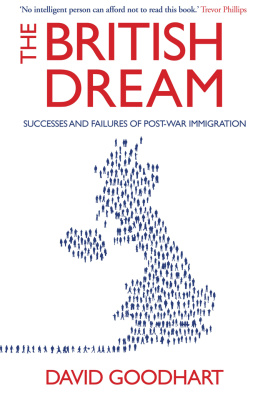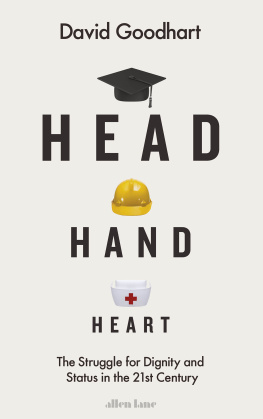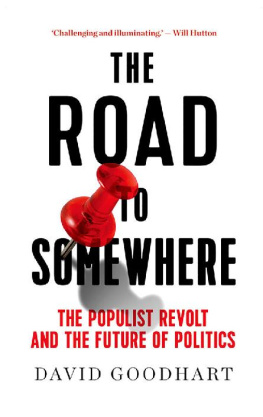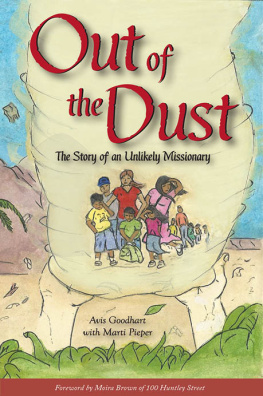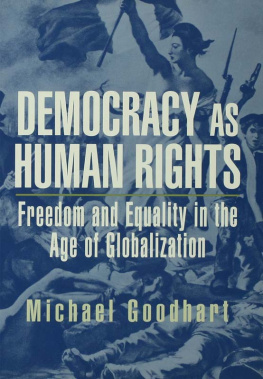David Goodhart - Head, Hand, Heart: Why Intelligence Is Over-Rewarded, Manual Workers Matter, and Caregivers Deserve More Respect
Here you can read online David Goodhart - Head, Hand, Heart: Why Intelligence Is Over-Rewarded, Manual Workers Matter, and Caregivers Deserve More Respect full text of the book (entire story) in english for free. Download pdf and epub, get meaning, cover and reviews about this ebook. year: 2020, publisher: Free Press, genre: Politics. Description of the work, (preface) as well as reviews are available. Best literature library LitArk.com created for fans of good reading and offers a wide selection of genres:
Romance novel
Science fiction
Adventure
Detective
Science
History
Home and family
Prose
Art
Politics
Computer
Non-fiction
Religion
Business
Children
Humor
Choose a favorite category and find really read worthwhile books. Enjoy immersion in the world of imagination, feel the emotions of the characters or learn something new for yourself, make an fascinating discovery.

- Book:Head, Hand, Heart: Why Intelligence Is Over-Rewarded, Manual Workers Matter, and Caregivers Deserve More Respect
- Author:
- Publisher:Free Press
- Genre:
- Year:2020
- Rating:4 / 5
- Favourites:Add to favourites
- Your mark:
- 80
- 1
- 2
- 3
- 4
- 5
Head, Hand, Heart: Why Intelligence Is Over-Rewarded, Manual Workers Matter, and Caregivers Deserve More Respect: summary, description and annotation
We offer to read an annotation, description, summary or preface (depends on what the author of the book "Head, Hand, Heart: Why Intelligence Is Over-Rewarded, Manual Workers Matter, and Caregivers Deserve More Respect" wrote himself). If you haven't found the necessary information about the book — write in the comments, we will try to find it.
David Goodhart: author's other books
Who wrote Head, Hand, Heart: Why Intelligence Is Over-Rewarded, Manual Workers Matter, and Caregivers Deserve More Respect? Find out the surname, the name of the author of the book and a list of all author's works by series.
Head, Hand, Heart: Why Intelligence Is Over-Rewarded, Manual Workers Matter, and Caregivers Deserve More Respect — read online for free the complete book (whole text) full work
Below is the text of the book, divided by pages. System saving the place of the last page read, allows you to conveniently read the book "Head, Hand, Heart: Why Intelligence Is Over-Rewarded, Manual Workers Matter, and Caregivers Deserve More Respect" online for free, without having to search again every time where you left off. Put a bookmark, and you can go to the page where you finished reading at any time.
Font size:
Interval:
Bookmark:
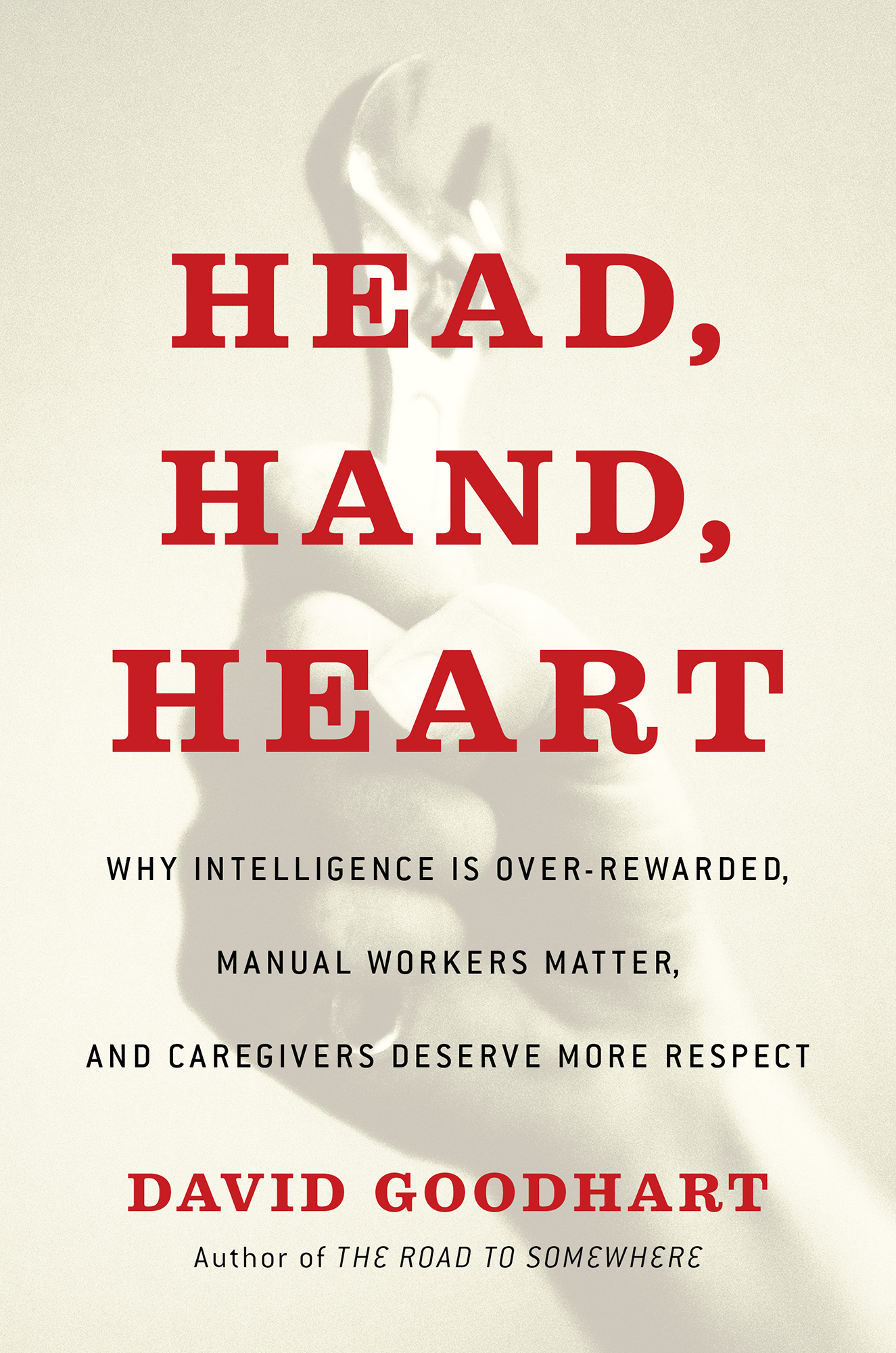

To my children, in the hope that they might finally read something I have written
I wrote most of this book before the Covid-19 crisis struck. Yet the crisis and its likely consequences have a direct bearing on its main theme: the lop-sided distribution of status that has become such a feature of rich societies in recent decades. For one thing it has made the unthinkable thinkable. If we can close down society and economic life for months and collectively underwrite at least some of the cost, then it becomes a little bit easier to imagine that we might adjust the status balance in our educationally stratified, postindustrial societies by a few degrees.
Most of us have wanted things to return to normal as swiftly as possible, but these coming years will also surely prove a hinge moment for politics in those rich countries in Europe and North America that have been overwhelmed by the crisis. There are several ways in which the crisis will enable, in the language of this book, Hand (manual work) and Heart (care work) to claim back some of the prestige and reward they have lost to Head (cognitive work) in recent decades.
At the most macro level a new version of globalization is now possible, summed up in one of the wittier slogans of the crisis: workers of the world unite, you have nothing to lose but your supply chains. Full-scale deglobalization is highly undesirable and is not going to happen; we have learned the lessons of 1930s protectionism. But some restraints on what economist Dani Rodrik has called hyper-globalizationthe globalization that has favored large corporations, financial markets, and mobile skilled professionalscan be put in place.
The crisis has been the hour of the nation state and national social contracts at least in Europe, though in the United States it is the relative weakness of the central state that has been exposed. National democracies are likely to claim a greater say in the next phase of globalization. There will be some reshoring and shortening of those long, vulnerable supply chains. Lowest-cost globalization, which regrets the closure of the Midwest manufacturing plant but sees it as a price worth paying for cheaper goods in Walmart, will no longer win the argument so easily. Most of us are producers as well as consumers, and we might be prepared to pay a few dollars more for a smartphone produced closer to home.
Some of this sentiment was strengthening before the crisis. World trade fell slightly in 2019, partly as a result of the argument between the United States and China about what constitutes fair trade arrangements. The existing model of helter-skelter globalization has been producing too many losers, not least the global environment.
Western society has been dominated in the past two generations by centrifugal forces that have spread global openness and individual freedom but weakened collective bonds and enabled Head work to claim undue reward while Hand and Heart work has diminished in dignity and pay. The knowledge economy has placed cognitive meritocracy at the center of the status hierarchy, and the cognitively blessed have thrivedbut many others feel they have lost place and meaning.
Recent political trends, surely reinforced by the pandemic, suggest we are moving into a more centripetal phase, in which the nation-state will be consolidated and economic and cultural openness will be a little more constrained. This phase will place more stress on localism, social stability, and solidarity, it will be more skeptical of the claims of the Head and more sensitive to the humiliations built into modern, achievement societies, including for minorities.
As I was writing the book in 2019, I would not have dared to imagine the public appreciations of the Hand and Heart workers that became such a dominant image of the early weeks of the crisis. People were applauding not just those working in health services but also those who maintain the hidden wiring of our everyday livesthe supermarket shelf stackers, the bus drivers and delivery people, those who maintain the food and drug supply chains and remove household waste. Not all of them are manual workers in a literal sense but all of them do essential jobs. In a partial inversion of the status hierarchy, many of the truly key workers turned out to be people who did not go to college and were less adept at manipulating information. Not all are hand workers in a literal sense, nor the factory workers of old, but all do essential jobs, and in the United Kingdom and United States at the height of the crisis it was males, especially older ethnic minority males, in those frontline jobs who were twice as likely to die from Covid-19 as the wider working population.
The pause for reflection that the lockdown imposed on normally hectic, achievement-orientated societies and individuals may leave the deepest traces of all. Many of us, perhaps especially the privileged and highly educated, have been forced to reconsider what we value most deeply and, having looked up from our busy, mobile, existences, often met a neighbor for the first time and actually felt rooted in a physical community. And then, stepping out from our immediate neighborhoods, we have smiled and nodded at strangers even while politely giving them a wide berth.
This new sense of rootedness and connection, along with the heightened awareness of our mortality, can spill over into a mawkish sentimentality and a safetyism that eschews all risk and refuses all trade-offs. At the other end of the spectrum many people desperately want to enjoy their old freedoms, including the freedom to treat our fellow citizens with normal indifference. Some predict not so much a gentler, more caring society emerging from the crisis but a wilder and angrier one, a new roaring twenties. Perhaps the Black Lives Matter eruption was a premonition of that.
But the care economy has been at the center of the crisis, and that in itself is likely to prompt some reevaluation of mainstream economic and political thought. Just as old attitudes to large-scale government debt, and even printing money, have had to be revised even by conservative-minded politicians, so we may be pushed to reconsider our attitudes to productivity and even the very idea of the economic sphere.
Rich Western societies already spend a large part of GDP on care, health, and welfare; this share is likely to increase another step in the wake of the crisis. And surely we need to more openly acknowledge that what we want in many parts of the care economy, from ICUs to elderly care homes, is lower productivity, not higher. We want fewer beds per nurse not more. This is true in large parts of the Heart economy, in health, and in education. And if we are to upwardly revalue the public care economy, and fund better the Cinderella parts such as elderly care, then what about the work done in the private care economy of the home looking after the young and the old? Should that not also be valued more too and not seen as a domain of oppression and limited opportunity?
That raises big questions about the gender division of labor and how to revalue domesticity without undoing the freedoms that women have achieved in recent decades. Our enforced confinement in the home caused much family tension, couple separation, and even violence. But it was also a reminder to many people of the primary value of family and the hard work of nurture and education that takes place within its walls. If Britains health service is, as the Conservative Prime Minister, Boris Johnson, declared, powered by love then how much more so the private realm of the family.
Font size:
Interval:
Bookmark:
Similar books «Head, Hand, Heart: Why Intelligence Is Over-Rewarded, Manual Workers Matter, and Caregivers Deserve More Respect»
Look at similar books to Head, Hand, Heart: Why Intelligence Is Over-Rewarded, Manual Workers Matter, and Caregivers Deserve More Respect. We have selected literature similar in name and meaning in the hope of providing readers with more options to find new, interesting, not yet read works.
Discussion, reviews of the book Head, Hand, Heart: Why Intelligence Is Over-Rewarded, Manual Workers Matter, and Caregivers Deserve More Respect and just readers' own opinions. Leave your comments, write what you think about the work, its meaning or the main characters. Specify what exactly you liked and what you didn't like, and why you think so.

